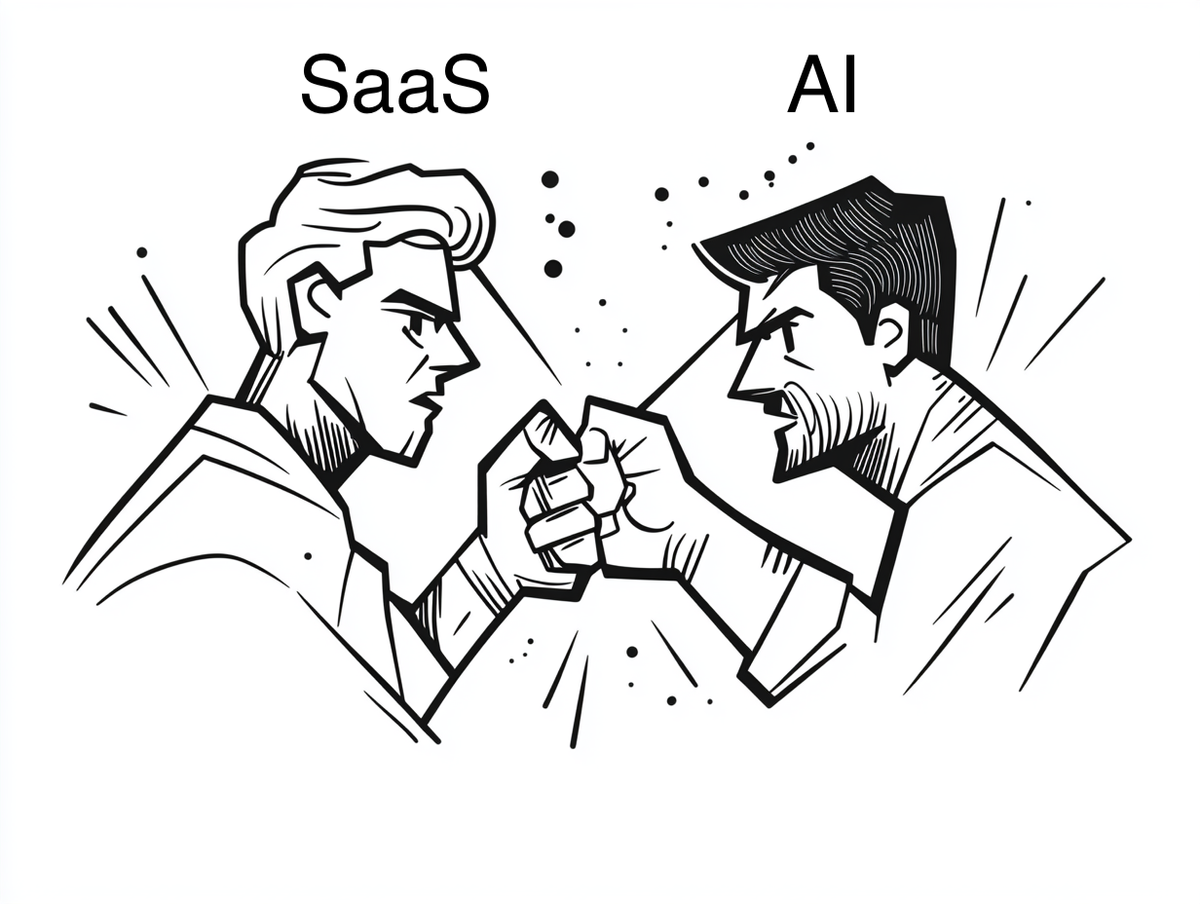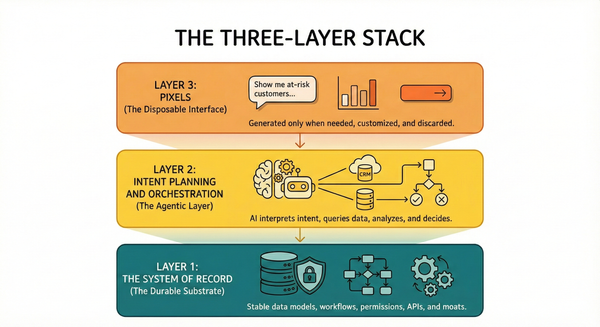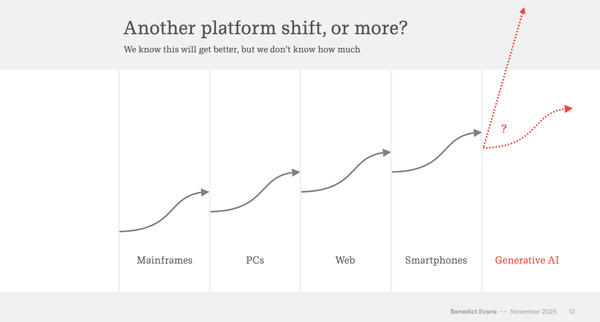What happens to Software when making software cost nothing? Is SaaS Dead?

Imagine typing your ideas in plain English and watching AI turn them into working software. Sounds like science fiction, right? But it's happening now. We're on the edge of a new era where you don't need coding skills or a computer science degree to create software.
Somewhere out there, an entrepreneur who has never written a line of code is using AI to build software. In a few months, they might make their first million dollars. It's thrilling, but it raises big questions about the future of the software industry, especially for big SaaS companies.
If making software is now so easy and cheap, why are SaaS giants like Salesforce still valued so highly in the stock market? If anyone can develop and launch software with minimal effort, shouldn't these giants be worried?
The Perceived Threat to SaaS
There's a growing narrative that SaaS is under immense pressure. Critics argue that the democratization of software development, powered by AI, will disrupt traditional SaaS models. Companies like Klarna are already creating internal tools, claiming they no longer need services like Salesforce. The logic is straightforward: if businesses can build tailor-made solutions quickly and cheaply, the demand for traditional SaaS offerings might dwindle.
Furthermore, startups and solopreneurs are now equipped with tools that level the playing field. They can innovate faster, adapt more quickly, and potentially outpace the slower-moving behemoths. The barriers to entry have lowered, and the market is ripe for disruption.
How Established SaaS Companies are expected to show Resilience?
Despite these concerns, there's a strong case to be made for the continued dominance of established SaaS companies. It's not just about the software they provide; it's about the comprehensive value they offer to their clients. Here are some ways:
1. Solving Complex Workflow Problems
At the heart of every successful SaaS company is a commitment to solving intricate workflow challenges. These aren't issues that can be addressed with a simple app or a basic piece of code. They require deep industry knowledge, extensive research and development, and a nuanced understanding of client needs.
Consider Salesforce. It's not just a Customer Relationship Management (CRM) tool; it's an ecosystem that integrates sales, marketing, service, and analytics. Businesses rely on it to manage complex operations that are critical to their success. Replacing such a system isn't as simple as swapping out one app for another.
2. Sticky Installs and Integration Depth
One of the reasons SaaS solutions are so entrenched in businesses is due to their sticky nature. Once integrated, these systems become the backbone of operations. They are deeply woven into various departments, processes, and data flows.
The inertia to change is substantial. Businesses are often hesitant to rip out and replace systems that work, especially when those systems are mission-critical. The risks associated with transition—downtime, data loss, training costs—are significant deterrents.
3. Distribution and Brand Advantage
Established SaaS companies have something that new entrants lack: a robust distribution network and a trusted brand. They've spent years, if not decades, building relationships with clients, understanding their evolving needs, and proving their reliability.
This trust isn't easily replicated. Even if a new software solution promises better features or lower costs, businesses might stick with their current provider simply because of the relationship and proven track record. It's similar to how consumers continue to shop on Amazon. Despite alternatives being just a click away, the familiarity, trust, and seamless experience keep them coming back.
4. Adapting and Embracing AI
Another critical point is that established SaaS companies aren't standing still. They're well aware of the shifts in the industry and are actively investing in AI and other emerging technologies.
Take Salesforce's Einstein as an example. It's an AI layer that's being integrated across Salesforce's suite of products, enhancing everything from analytics to customer interactions. By embedding AI into their existing offerings, they're adding value for clients without requiring them to switch platforms.
Other SaaS giants are making similar moves, ensuring they remain at the forefront of technological advancements. They have the resources, talent, and client base to rapidly implement and scale these innovations.
5. Reinventing Business Models
We can draw parallels to the cloud revolution of the 2010s. Companies like Adobe transitioned from selling licensed software to offering cloud-based subscriptions. This shift wasn't easy—it faced internal resistance and required a fundamental change in how they operated. However, it ultimately led to sustained growth and relevance in a changing market.
SaaS companies today are undergoing similar transformations. They're not oblivious to the threats posed by AI and low-code/no-code solutions. Instead, they're leveraging these technologies to enhance their offerings, improve customer satisfaction, and streamline operations.
What about Startups and solopreneurs?
For startups and solopreneurs, the landscape is both exciting and challenging. On one hand, AI tools empower them to develop software faster and with fewer resources. The potential to innovate and disrupt has never been greater.
However, they face significant hurdles when competing against established players, including:
1. Distribution Challenges
Without an existing customer base or distribution network, getting their product into the hands of users is a steep uphill battle. Marketing budgets are limited, and breaking through the noise requires substantial effort.
2. Meeting Elevated Expectations
AI hasn't just made software development easier; it has also raised the bar for quality. Clients now expect more polished products, faster updates, and seamless integrations. What used to be considered a final draft is now just the starting point. Startups must meet these heightened expectations with fewer resources.
3. Competing with Continuous Innovation
Established companies are continuously enhancing their products. With dedicated teams, vast resources, and significant R&D investments, they can implement new features and improvements at a pace that's hard for smaller teams to match.
The Future of SaaS in an AI-Driven World
So, is SaaS dead? Far from it. The core value propositions of SaaS companies—solving complex problems, providing reliable and integrated solutions, and leveraging strong distribution channels—remain incredibly relevant.
AI as an Enabler, Not a Destroyer: AI should be seen as a tool that can enhance SaaS offerings rather than a threat that will render them obsolete. By integrating AI, SaaS companies can provide smarter, more efficient, and more personalized solutions to their clients.
The Importance of Trust and Relationships: Business relationships are built on trust, reliability, and proven performance. Established SaaS companies have spent years cultivating these relationships. While new entrants can offer innovative solutions, building the same level of trust takes time.
Opportunities for Collaboration: There's ample room for collaboration between startups and established companies. Startups can bring fresh ideas and agility, while larger companies can offer resources and market access. Partnerships, acquisitions, and integrations can be mutually beneficial.
Conclusion: Adaptation Over Extinction
The narrative that SaaS is dead overlooks the adaptability and resilience of established companies. History has shown that businesses willing to evolve tend to survive and even thrive amid technological shifts.
SaaS companies are not complacent. They're actively integrating AI, reinventing their business models, and finding new ways to add value for their clients. The market recognizes this, which is why these companies continue to be highly valued.
For startups and solopreneurs, the path forward is challenging but not impossible. Success will require not just leveraging AI for development but also finding innovative ways to deliver value, build trust, and meet the elevated expectations of today's market.
In this new era of software creation, the players who adapt, innovate, and focus on delivering genuine value will lead the way. SaaS isn't dead—it's evolving. And those who recognize and embrace this evolution will shape the future of the industry.





